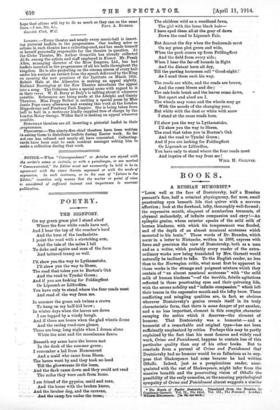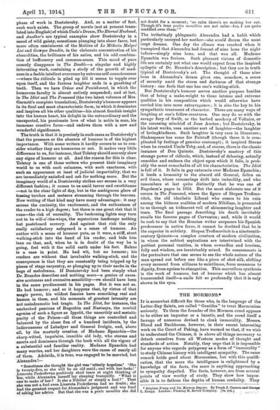BOOKS.
A RUSSIAN HUMORIST.*
"Loco/ well at the face of Dostoievsky, half a Russian peasant's face, half a criminal physiognomy, flat nose, small penetrating eyes beneath lids that quiver with a nervous affection'; look at the forehead, lofty, thoroughly well-formed; the expressive month, eloquent of numberless torments, of abysmal melancholy, of infinite compassion and envy!—An epileptic genius, whose exterior speaks of the mild milk of human kindness, with which his temperament was flooded, and of the depth of an almost maniacal acuteness which mounted to his brain." These words of Dr. Brandes, which occur in a letter to Nietzsche, written in 1888, express with force and- precision the view of Dostoievsky, both as a man and as a writer, which probably every reader of the extra- ordinary works now being translated by Mrs. Garnett would naturally be inclined to tate. To the English reader, no less than to the Norwegian critic, what must first be apparent in those works is the strange and poignant mixture which they contain of "an almost maniacal acuteness" with "the mild milk of human kindness "—of the terrible, febrile agitations reflected in those penetrating eyes and their quivering lids, with the serene nobility and "infinite compassion" which left their traces in the expressive mouth and the lofty brow. These conflicting and mingling qualities are, in fact, so obvious wherever Dostoievsky's genius reveals itself in its truly characteristic form, that there is some danger of yet another, and a no less important, element in this complex, character escaping the notice which it deserves—the element of humour. That Dostoievsky was a humorist— and a humorist of a remarkable and original type—has not been sufficiently emphasized by critics. Perhaps this may be partly explained by the fact that his most famous and widely read work, Crime and Punishtnent, happens to contain less of this particular quality than any of his other books. But to conclude from a perusal of Crime and Punishment that Dostoievsky had no humour would be as fallacious as to sup- pose that Shakespeare had none because he had written Ofhell6. Indeed, just as a perspicacious reader, unac- quainted with the rest of Shakespeare, might infer from the massive breadth and the penetrating vision of Othello the possibility of the early comedies, so the amazing psychological sympathy of Crime and Punishment almost suggests a similar • The Nome. of Yyodor Dost.oeasky. Translated from the Raspier, by Conetance Garnett. Vol. II., The Idiot. Vol. Ill., The Possessed. London .1 Wihissa Ilelneraann. [Sa ed. stet esch.i
phase of work in Dostoleveky. And, as a matter of fact, such work exists. The group of novels (not at present trans- lated into English) of which Uncle's Dream, The Eternal Husband, and Another's are typical examples show Dostoievsky in a nroodof wild gaiety, sometimes plunging into sheer farce, but more often reminiscent of the Moliere of Le Midecin Malgri Lui and Gedives Dandin, in the elaborate concentration of his absurdities, the brilliance of his satire, and his odd combina- tion of buffoonery and common-sense. This mood of pure comedy disappears in The Double—a singular and highly interesting work, containing a study of the growth of mad- ness in a feeble intellect overcome by extreme self-consciousness —where the ridicule is piled up till it seems to topple over upon itself, and the furious laughter ends in a gnashing of teeth. Then we have Crime and Punishment, in which the humorous faculty is almost entirely suspended; and at last, in The Idiot and The Possessed (the two latest volumes of Mrs. Garnett'a complete translation). Dostoievsky's humour appears in its final and most characteristic form, in which it dominates and inspires all his other qualities—his almost fiendish insight into the human heart, his delight in the extraordinary and the unexpected, his passionate love of what is noble in man, his immense creative force—and endows them with a new and wonderful significance.
The truth is that it is precisely in such cases as Dostoievaky's that the presence or the absence of humour is of the highest importance. With some writers it hardly occurs to us to con- sider whether they are humorous or not. It makes very little difference to us, for instance, that Tolstoy should scarcely show any signs of humour at all. And the reason for this is clear. Tolstoy is one of those writers who present their imaginary world to us with such calmness, with such exactness, with such an appearance at least of judicial impartiality, that we are immediately satisfied and ask for nothing more. But the imaginary world of a Dostoieveky strikes our senses in a very different fashion; it comes to us amid terror and exorbitance —not in the clear light of day, but in the ambiguous glare of tossing torches and meteors streaming through the heavens. Now writing of that kind may have many advantages : it may arouse the curiosity, the excitement, and the enthusiasm of the reader to a high degree; but there is one great risk that it runs—the risk of unreality. The beckoning lights may turn out to be will-o'-the-wisps, the mysterious landscape nothing but pasteboard scenery. And against that risk the only really satisfactory safeguard is a sense of humour. An author with a sense of humour puts, as it were, a stiff, stout walking-stick into the hand of his reader, and bids him lean on that, and, when he is in doubt of the way he is going, feel with it the solid earth under his feet. Balzac is a case in point. He had wit, but no humour; his readers are without that invaluable walking-stick, and the consequence is that they are constantly being tripped up by pieces of stage carpentry, or plunging up to their necks in the bogs of melodrama. If Dostoievsky had been simply what Dr. Brandes describes and nothing more—a genius of exces- sive acuteness and excessive-sensibility—we should have been in the same predicament in his pages. But it was not so. He had humour ; and so it happens that, by virtue of that magic power, his wildest fancies have something real and human in them, and his moments of greatest intensity are not melodramatic but tragic. In I'he Idiot, for instance, the unchecked passions of Rogozhin and Nast:ewe, the morbid agonies of such a figure as Ippolit, the unearthly and ecstatic purity of the Prince—all these things are controlled and balanced by the sheer fun of a hundred incidents, by the ludicrousness of Lebedyev and General Ivolgin, and, above all, by the masterly creation of Madame Epanchin—the sharp-witted, impulsive, irascible old lady, who storms and snorts and domineers through the book with all the vigour of a substantial and familiar reality. Madame Epanchin had many worries, and her daughters were the cause of nearly all of them. A.delaida, it is true, was engaged to be married, but
'Alexandra Sometimes she thought the girl was.' utterly hopeless.' 'She is twenty-five, so she will be an old maid ; and with her looks!' _Lizaveta Prokofievna positively shed tears at night thinking of her, while 'Alexandra herself lay sleeping tranquilly. • What is one to make of her ? Is she a Nihilist or simply a fool V That she was not a fool even Lizaveta Prokofievna had no doubt she had the greatest respect for Alexandra's judgment and was fond of asking her aclyice. But that she was a pule vioniliee she did
not doubt for a moment; 'so calm there's no making her out. Though it's true posies mouilltes are not calm—foe, I am quite muddled over them.' "
The irritatingly phlegmatic Alexandra had a habit which particularly annoyed her mother—she would dream the most inept dreams. One day the climax was reached when it transpired that Alexandra had dreamt of nine hens the night before—simply nine hens, and that was all. Madame Epanchin was furious. Such pleasant visions of domestic life are certainly not what one would expect from the inspired epileptic of Dr. Brandes's description ; but they are in truth typical of Dostoievsky's art. The thought of those nine hens in Alexandra's dream gives one, somehow, a sense of security amid the storm and darkness of that strange history: one feels that one has one's walking-stick.
But Dostoievsky's humour serves another purpose besides that of being a make-weight to those intense and extreme qualities in his composition which would otherwise have carried him into mere extravagance ;_it is also the key to his sympathetic treatment of character. There are many ways of laughing at one's fellow-creatures. One may do so with the savage fury of Swift, or the barbed mockery of Voltaire, or the caressing mischief of Jane Austen; but Dostoievsky, in his latest works, uses another sort of laughter—the laughter of lovingkindness. Such laughter is very rare in literature ; Shakespeare has some for Falstaff (though there it is com- plicated by feelings of genuine contempt); it inspired Steme when he created Uncle Toby, and, of course, there is the classic instance of Don Quixote. Dostoievsky's mastery of this strange power of ridicule, which, instead of debasing, actually ennobles and endears the object upon which it falls, is prob- ably the most remarkable of all his characteristics. The Idiot is full of it. It falls in gay cataracts over Madame Epanchin; it lends a humanity to the absurd old General, fallen on evil times, whose romancings drift into imbecility, and who remembers at last quite distinctly that he was one of Napoleon'.' pages in 1814. But the moat elaborate use of it occurs in The Possessed, where the figure of Stepan Trofimo- vita, the old idealistic Liberal who comes to his ruin among the hideous realities of modern Nihilism, is presented to us through an iridescent veil of shimmering laughter and tears. The final passage describing his death inevitably recalls the famous pages of Cervantes ; and, while it would be rash to say that the Russian writer surpasses his Spanish predecessor in native force, it cannot be doubted that he is the superior in subtlety. Stepan Trofiraovitch is a nineteenth- century Quixote—a complex creature of modern civilization, in whom the noblest aspirations are intertwined with the pettiest personal vanities, in whom cowardice and heroism, folly and wisdom, are inextricably mixed. So consummate is the portraiture that one seems to see the whole nature of the man spread out before one like a piece of shot silk, shifting every moment from silliness to saintliness, from meanness to dignity, from egoism to abnegation. This marvellous synthesis is the work of humour, but of humour which has almost transcended itself—a smile felt so profoundly that it is only shown in the eyes.







































 Previous page
Previous page